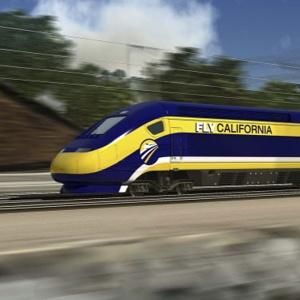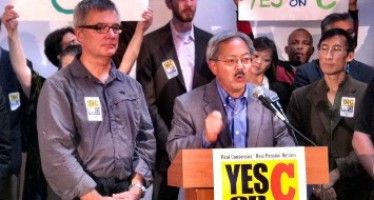Bullet train plan counting on new federal funding
 The draft business report released last week by the California High-Speed Rail Authority presumes that $2.9 billion more in additional federal funding will be provided in coming years to help pay for the approximately $20 billion cost of the initial 250-mile segment linking the Central Valley and Silicon Valley.
The draft business report released last week by the California High-Speed Rail Authority presumes that $2.9 billion more in additional federal funding will be provided in coming years to help pay for the approximately $20 billion cost of the initial 250-mile segment linking the Central Valley and Silicon Valley.
“Traditionally, transportation projects of this magnitude can rely on the federal government as a funding partner with grants of up to 50 percent or higher. The Legislature and the voters of California, in approving Proposition 1A, assumed significant federal participation – 1/3 of the total cost. With a federal contribution for these extensions, its share of the total funding for the Silicon Valley to Central Valley line would still be only 25 percent of the total investment, far below the norm,” the report states in section 6, which details long-term funding strategies, assumptions and plans.
But based on what’s happened in Washington in recent years, the notion that “traditional” federal support for major transportation projects will help California secure more funding doesn’t seem grounded in reality. The prospect of Congress earmarking funds to help one state build a bullet-train network seems unlikely for two reasons.
‘Monumental waste of precious transportation dollars’
One reason is specific. House Republicans, led by Majority Leader Kevin McCarthy of Bakersfield, have been critical of the California project for years. They’ve cited the decision to give more than $3 billion in 2009 stimulus bill funding to the state as an example of wasteful stimulus spending and highlighted missed deadlines for starting construction. McCarthy co-authored a January 2015 op-ed for the Sacramento Bee spelling out his implacable opposition:
The current plan for high-speed rail is nearly twice as expensive as promised to California taxpayers. The projected travel times and fares have nearly doubled. The plan bears no resemblance to the one put before voters in 2008. One analysis after another has raised these red flags, but supporters in Sacramento refuse to admit that fundamental flaws exist and continue to press on, no matter the cost.
These objective reviews expose a business plan flawed at its core – unrealistic ridership numbers, a ballooning price tag (just last year, the California High-Speed Rail Authority increased its cost estimate for a Central Valley segment by $1 billion) and private investment that is still nowhere to be found. …
This is not what voters envisioned when Proposition 1A was presented to them. It is now clear that this project remains wholly unviable and is a monumental waste of precious transportation dollars that would be far better spent on roads, light rail and traditional heavy rail.
Because of effective gerrymandering in many states after the 2010 census, Republicans are unlikely to lose control of the House until the 2022 elections, after redistricting following the next census.
Discretionary spending limited in post-sequester era
One reason why new federal funding is unlikely is more general. Even if Democrats regained control of Congress and maintained control of the White House this November, funding for what budget wonks call “non-defense discretionary spending” is tighter than it has been in decades. The Center on Budget and Policy Priorities predicts that in 2018, such spending will be less than 3 percent of the U.S. gross domestic product in 2018 — the lowest percentage in more than 50 years — and will keep going down through 2026.
Even if federal revenue surges as it did in the late 1990s, this trend of declining discretionary domestic spending is likely to continue. The Congressional Budget Office’s 2015 Long-Term Budget Outlook predicts sharply increasing pressure on the federal budget over the next decade because “an aging population, rising health care costs per person, and an increasing number of recipients of exchange subsidies and Medicaid benefits attributable to the Affordable Care Act would push up spending for some of the largest federal programs if current laws governing those programs remained unchanged. Moreover, CBO expects interest rates to rebound in coming years from their current unusually low levels, raising the government’s interest payments on debt.”
Because of these budgetary pressures, the prospects for any state-specific project getting major federal support seems unlikely. Even if the Affordable Care Act was changed dramatically, the budget picture would only improve marginally. Entitlement program costs, paying interest on the national debt and the national security budget could exceed annual federal revenue all by themselves by 2025, the CBO has reported.
Chris Reed
Chris Reed is a regular contributor to Cal Watchdog. Reed is an editorial writer for U-T San Diego. Before joining the U-T in July 2005, he was the opinion-page columns editor and wrote the featured weekly Unspin column for The Orange County Register. Reed was on the national board of the Association of Opinion Page Editors from 2003-2005. From 2000 to 2005, Reed made more than 100 appearances as a featured news analyst on Los Angeles-area National Public Radio affiliate KPCC-FM. From 1990 to 1998, Reed was an editor, metro columnist and film critic at the Inland Valley Daily Bulletin in Ontario. Reed has a political science degree from the University of Hawaii (Hilo campus), where he edited the student newspaper, the Vulcan News, his senior year. He is on Twitter: @chrisreed99.
Related Articles
Ruling on pension bonuses shows obstacles to CA reform
Providing bonus checks to government retirees when pension funds have good years has long been common and controversial around California.
86 million private-sector workers support 148 million benefit takers
U.S. Census numbers tell why America’s economy is sluggish and likely headed downward again: There are just 86 million full-time
GOP split weakens party
Steven Greenhut: My old friend and OC political activist and blogger Larry Gilbert offers his thoughts on the Republican Party




